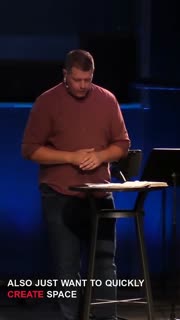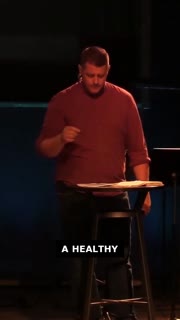Exploring the Historical Reliability of Scripture
Devotional
Sermon Summary
Bible Study Guide
Sermon Clips
### Quotes for Outreach
1. "As a church, we've been in this series called Why It Matters. We've talked about some of the bigger pieces of our faith and tried to lay out why it should matter to us as modern-day Christ followers. We've talked about things like why does sound doctrine matter? Why it matters that we have a healthy understanding of scripture and what we teach. We've talked about the importance of the gospel. Why does it matter that Jesus Christ rose from the grave?" [03:10] (25 seconds)
2. "I also just want to quickly create space for anybody here today, whether you're in this room or maybe listening online, that if you are wrestling with doubts about scripture, that's okay. There is room for doubt within faith because out of doubt can come some really great questions. Because I don't know about you, but I know growing up it was looked down, upon to have questions about what the Bible says." [07:45] (30 seconds)
3. "If you claim Christ as your Lord and Savior, if you call yourself a Christian, then let me encourage you and implore you that you should be in God's word every single day. That Psalm chapter 1 talks about meditating on the law of the Lord night and day. Psalm 119 says that your word is a lamp unto my feet and a light unto my path. Guys, God's word is so much more than a textbook. It's more than a history lesson. It's more than a set of rules to live by." [26:00] (31 seconds)
4. "Guys, scripture supports Jesus as the Messiah, as our Lord, as our Savior. But it is in him and in Jesus because there is no one that is less than me and I acknowledge that but the truth is that in him there is no one that is more. Jesus is the one that is more than us, the one who is more than us is the one who is more than us." [27:30] (39 seconds)
5. "See, we're called not just to believe that the Bible is reliable but man we're called to try it, to experience it and to allow it to lead us and guide us and reveal the heart of God to us. May we as a church and as individuals grow closer to God through his word." [28:50] (22 seconds)
### Quotes for Members
1. "There are several arguments out there as to why the Bible is not reliable. But of course there are. I mean, the Bible is one of the most important texts in existence. It is pivotal to the Christian faith, and people have been trying to disprove the Bible as long as it has been around. And at the same time, may that encourage us as Christ followers that people have been trying to, disprove, cast doubt, and deny scripture all along." [05:00] (33 seconds)
2. "Another reason that we can be confident that scripture is reliable is because of the eyewitness accounts and testimony. Now eyewitness has always been one of the strongest sources of trying to figure out truth. So think about a court case. Now one of the most common things that you'll hear in court is an eyewitness being put on the stand under oath and being examined and cross-examined about the validity of whatever the issue is at hand." [12:00] (27 seconds)
3. "But as we prepare to close with a song this morning, I want to ask you guys one final question. What role does the Bible play in your own life and that's something we can all reflect upon. Is the Bible just this book that you happen to read on Sunday mornings or is it something that your parents say is really really important but you're not so sure? Is it something that you pick up when life gets hard?" [25:00] (31 seconds)
4. "Throughout Jesus's ministry we see him upholding, quoting and valuing scripture. In Matthew chapter 5 verses 17 and 18 it says, do not think that I have come to abolish the law or prophets I have not come to abolish them but to fulfill them for truly I tell you until heaven and earth disappear not the smallest letter not the least stroke of a pen will by any means disappear from the law until everything is accomplished." [22:50] (29 seconds)
5. "A healthy approach asks where do those two things meet and I would say they meet when you have a relationship with Jesus and therefore I obey his commands study his words so I can grow in my relationship I can get to know God. But as we prepare to close with a song this morning I want to ask you guys one final question what role does the Bible play in your own life and that's something we can all reflect upon." [24:50] (41 seconds)
Ask a question about this sermon
1. "As a church, we've been in this series called Why It Matters. We've talked about some of the bigger pieces of our faith and tried to lay out why it should matter to us as modern-day Christ followers. We've talked about things like why does sound doctrine matter? Why it matters that we have a healthy understanding of scripture and what we teach. We've talked about the importance of the gospel. Why does it matter that Jesus Christ rose from the grave?" [03:10] (25 seconds)
2. "I also just want to quickly create space for anybody here today, whether you're in this room or maybe listening online, that if you are wrestling with doubts about scripture, that's okay. There is room for doubt within faith because out of doubt can come some really great questions. Because I don't know about you, but I know growing up it was looked down, upon to have questions about what the Bible says." [07:45] (30 seconds)
3. "If you claim Christ as your Lord and Savior, if you call yourself a Christian, then let me encourage you and implore you that you should be in God's word every single day. That Psalm chapter 1 talks about meditating on the law of the Lord night and day. Psalm 119 says that your word is a lamp unto my feet and a light unto my path. Guys, God's word is so much more than a textbook. It's more than a history lesson. It's more than a set of rules to live by." [26:00] (31 seconds)
4. "Guys, scripture supports Jesus as the Messiah, as our Lord, as our Savior. But it is in him and in Jesus because there is no one that is less than me and I acknowledge that but the truth is that in him there is no one that is more. Jesus is the one that is more than us, the one who is more than us is the one who is more than us." [27:30] (39 seconds)
5. "See, we're called not just to believe that the Bible is reliable but man we're called to try it, to experience it and to allow it to lead us and guide us and reveal the heart of God to us. May we as a church and as individuals grow closer to God through his word." [28:50] (22 seconds)
### Quotes for Members
1. "There are several arguments out there as to why the Bible is not reliable. But of course there are. I mean, the Bible is one of the most important texts in existence. It is pivotal to the Christian faith, and people have been trying to disprove the Bible as long as it has been around. And at the same time, may that encourage us as Christ followers that people have been trying to, disprove, cast doubt, and deny scripture all along." [05:00] (33 seconds)
2. "Another reason that we can be confident that scripture is reliable is because of the eyewitness accounts and testimony. Now eyewitness has always been one of the strongest sources of trying to figure out truth. So think about a court case. Now one of the most common things that you'll hear in court is an eyewitness being put on the stand under oath and being examined and cross-examined about the validity of whatever the issue is at hand." [12:00] (27 seconds)
3. "But as we prepare to close with a song this morning, I want to ask you guys one final question. What role does the Bible play in your own life and that's something we can all reflect upon. Is the Bible just this book that you happen to read on Sunday mornings or is it something that your parents say is really really important but you're not so sure? Is it something that you pick up when life gets hard?" [25:00] (31 seconds)
4. "Throughout Jesus's ministry we see him upholding, quoting and valuing scripture. In Matthew chapter 5 verses 17 and 18 it says, do not think that I have come to abolish the law or prophets I have not come to abolish them but to fulfill them for truly I tell you until heaven and earth disappear not the smallest letter not the least stroke of a pen will by any means disappear from the law until everything is accomplished." [22:50] (29 seconds)
5. "A healthy approach asks where do those two things meet and I would say they meet when you have a relationship with Jesus and therefore I obey his commands study his words so I can grow in my relationship I can get to know God. But as we prepare to close with a song this morning I want to ask you guys one final question what role does the Bible play in your own life and that's something we can all reflect upon." [24:50] (41 seconds)










